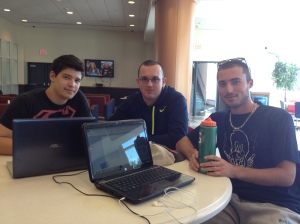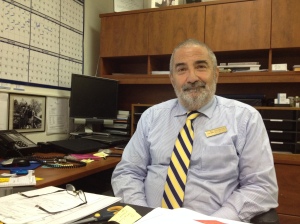Monica Zielinski – Online Editor
The maze of temporary fences in the Academic Quad due to campus construction is not the only thing students have to adjust to this semester. Last spring, the Student Government Association, Chartwell’s Food Services and the Dining Services Committee decided to change the hours of operation in the Adanti Student Center and Connecticut Hall. The changes became effective this fall semester.
Chairperson of the Dining Services Committee, Meaghan Tetro, said the goal is to make the student center the “main hub of campus” and to have more programming at night.
“The main reason for keeping the student center open later is so that there’s a place on campus that commuters can go to and just to create a more central location of student activity and a good atmosphere late at night,” said Tetro.
This year, Connecticut Hall is open from 7 a.m. to 8 p.m. Monday through Thursday. On Fridays it’s open from 7 a.m. to 2:30 p.m. and is closed on Saturdays. On Sundays, it’s open from 10 a.m. to midnight.
The Adanti Student Center serves food from 7 a.m. to midnight Monday through Thursday, and from 7 a.m. to 10 p.m. on Fridays. The student center is open on Saturdays from 7:30 a.m. to 10 p.m. and is closed on Sundays.
Due to the hour changes, resident Pauldine Joseph only has time to eat at Connecticut Hall once a week. She heard the hours were changed to encourage commuters to stay at the student center, but she said she doesn’t see why it has to affect her.
“I live on campus, so it doesn’t make sense that I have to suffer for the commuters—they’re going back home,” said Joseph.

Business management major, Greg Jositas said, “a majority of commuters try to schedule their classes so they’re done early in the morning or early in the afternoon so they can go home and work. Leaving the student center open later is not enough incentive to make them stay.”
Sophomore Brandon Bush said he likes the hour changes in the student center because he can bring food back to his dorm. If he’s up late doing work, he can get food and eat while he does work in his room. He did say, however, the food vendors had difficulty with the transition.
“At the beginning of the year, I would go to Mondo’s Subs at 11 o’clock and they would only have two meats and three cheeses,” said Bush. “Now I go back and it’s pretty well stocked.”
Junior Kayla Benedetto said she goes to the student center to pick up a quick meal when she doesn’t have time to go to Connecticut Hall but when she sees the long lines, she goes without eating until she can find the time.
As much as the hours of operation may hinder students’ schedules, the employees behind the serving counters are also feeling the effects of the changes.
On Sept. 17, a group of Local 217 Union members stood outside of Connecticut Hall and handed out flyers to students passing by. Union Stewards, Nicholas McDonald and Ebony Sanders were among those involved in the demonstration.
McDonald, a 20-year employee and one of the senior stewards who planned the protest, said the shifting of hours has impacted the employees and although minor adjustments have been made, a lot more needs to be done.
“This affects our kids. Happy customers, happy workers,” said McDonald. “If the workers aren’t happy, how can we serve our kids as we should? We want students to know that something is going on with the work overload because it’s been happening a lot.”
McDonald said it’s unacceptable for the workers to be expected to get the work done when there is a major shift in the hours. He said a lot of students are standing in longer lines and sometimes food runs out.
According to the director of the student center, Brad Crerar, 100 extra employee hours were added because of the changes in hours of operation. Union Steward Ebony Sanders said management came to the workers and asked them to create a schedule that would work for everyone and she said management accepted the schedule but didn’t honor it.
“We have double the work and less hours. The student center is open until 12 a.m. now and the lines are long because we don’t have enough workers,” said Sanders.
Sanders said the company hired six or seven new employees to fill shifts, rather than giving the hours to part-time employees.

Chartwells Resident District Manager Juan Dominguez said the hours of operation changed so much that all the employee’s schedules had to change. He said associates had the option to post their names and be awarded hours by seniority.
The employees who worked night shifts at Connecticut Hall and whose hours were cut, according to Sanders, had to exercise their bumping rights—a right that is stated in the agreement between Chartwells and Local 217.
According to the Society for Human Resource Management, a more senior employee is allowed to “bump” a less senior employee and take that employee’s job. For example, if a senior production manager’s hours are cut and he has bumping rights, he can take the hours of a less senior employee.
“This creates a whole domino effect because a lot of people’s hours got cut,” said Sanders. “Being that the student center was now staying open later, there was supposed to be enough work to go around for the people whose hours were cut. It didn’t happen and he [Dominguez] started hiring new people.”
Dominguez said the contract doesn’t allow management to schedule employees to different positions on the same day, so for example, an employee cannot be a food server in the morning and in general utility in the afternoon—which would be cross classification.
The agreement states, “except in the event of a bona fide emergency, employees shall only do the work customarily performed by their job classifications.”
As for the wait times, Dominguez turned his computer screen to show a color coded line graph, and said he looks at daily numbers of transactions at the registers and constantly compares traffic to worker’s schedules.
“Since we opened,” said Dominguez, “we have made 40 or 50 adjustments. We take the whole month of September to see how the students are adjusting to this new environment and we are looking at it daily.”
Tetro said the Dining Services Committee is working with Chartwells to implement healthier options for students and to offer breakfast later on Saturdays, but there is still more work to do.
Crerar, who works with Chartwells and the university, said this is an adjustment period.
“The students need to understand,” said Crerar, “that we had a couple of speed bumps in the beginning when we first opened up and we’re trying very hard to solve and problems they may have. It’s a work in progress and as long as the students come and tell us about it, we can work on the problem, but if we don’t know about it, we can’t correct what we don’t know.”
Photo Credit: Monica Zielinski




























































































Reblogged this on Monica Zielinski.